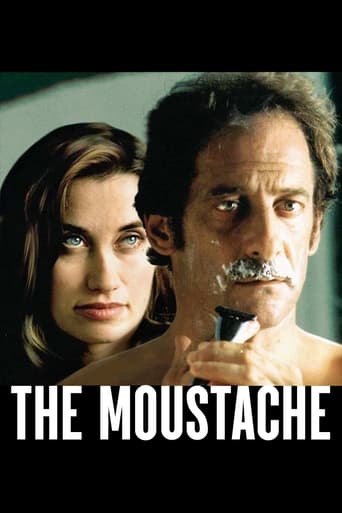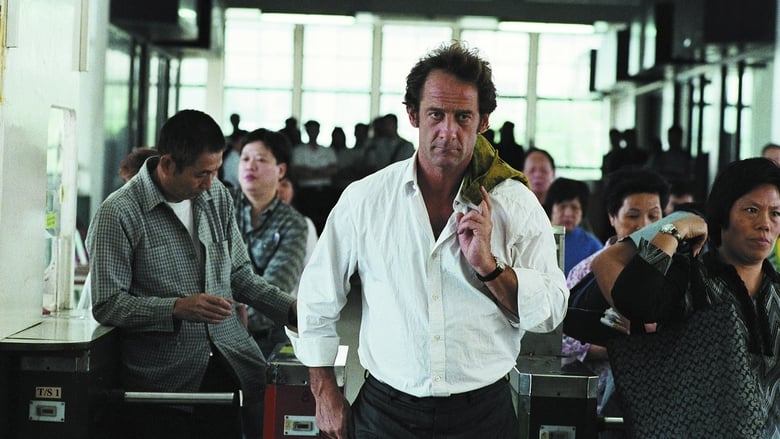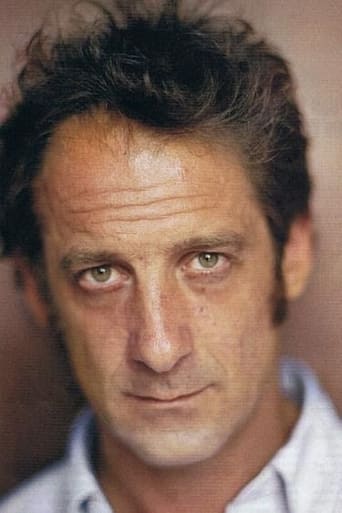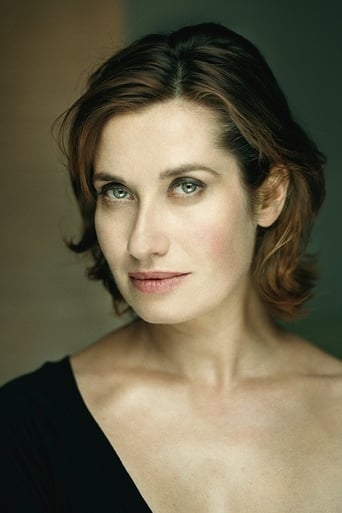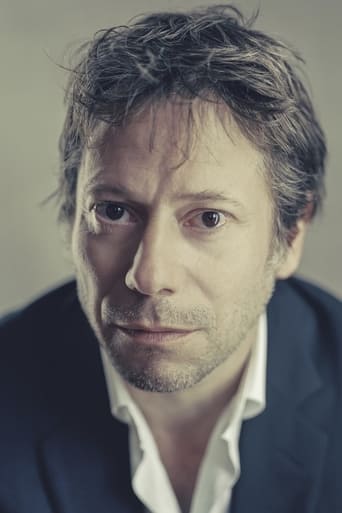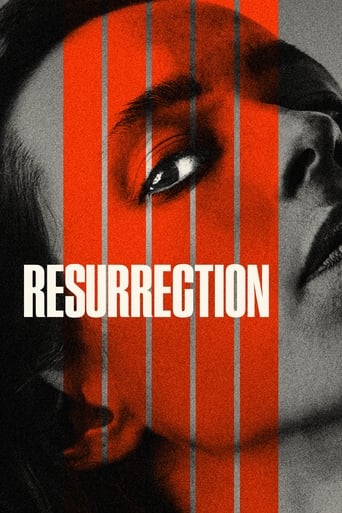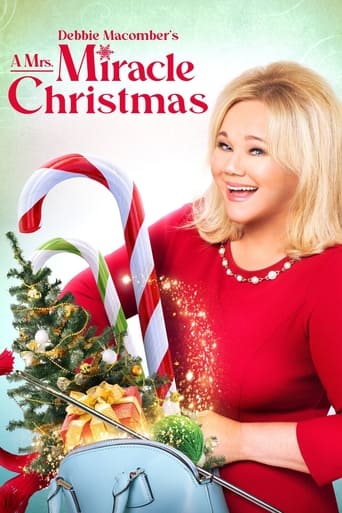The Moustache (2006)
One day, on a whim, Marc decides to shave off the moustache he's worn all of his adult life. He waits patiently for his wife's reaction, but neither she nor his friends seem to notice. Stranger still, when he finally tells them, they all insist he never had a moustache. Is Marc going mad? Is he the victim of some elaborate conspiracy? Or has something in the world's order gone terribly awry?
Watch Trailer
Free Trial Channels
Cast


Similar titles
Reviews
In truth, there is barely enough story here to make a film.
Not sure how, but this is easily one of the best movies all summer. Multiple levels of funny, never takes itself seriously, super colorful, and creative.
It is neither dumb nor smart enough to be fun, and spends way too much time with its boring human characters.
There's a more than satisfactory amount of boom-boom in the movie's trim running time.
Hello viewer. I watched this movie as it was tagged with "Mystery" amongst others. I like mystery, and don't mind additional tags such as "drama" at all. I regret watching it - wasting time. I'll explain in a moment.First the facts. The movie is about a man in his mid-life years who shaves off his mustache, yet nobody notices the difference. In fact, everybody claims he didn't have a mustache for the past 15 years. Even though we see physical evidence such as recent pictures. We even see him shaving off his mustache. From here on our star sinks into a life of confusion and mental agony.I can't help revealing the end to outline the criticism I have. The end basically leaves us in an ambiguous state. Was it all real? Is he going crazy, first signs of Alzheimer, mid-life crisis? We do not receive any answers and that is absolutely unforgivable. Because a potential "big reveal" is all the movie had going for.The pace is slow - to end up with nothing. With that I mean that much of the time spent is for our star to ask around if they notice any difference. We got the message after twenty minutes, but it kept dragging on. This movie could have been easily shortened by fifty percent, and it still would have retained its main narrative of ambiguity.So there it is, one sits through this slow movie only to be left with zero answers. The plot is that you have to make up your own reasons. I'm sorry but that will simply not do.I have two good things to say about the movie. First being the music. Philip Morris Glas' nihilistic classic music is really nice if you like classic music. For this movie it reminded me a bit of Vivaldi's "Spring". Whilst liking this, one may complain that it's too heavy, and the complaint might be justified indeed. The second thing I appreciate is the decent camera-job. The budget was "only" about five million Euros, yet we were not treated with shaky handycam like so many low-ish budget films do. Lighting, angles, lenses, it all was more or less OK. Meaning, watching the movie was mostly easy on the eye.For the good things, I rated the movie three stars. The lack of context and answers truly infuriated me. It's not that I desperately need answers, but I have been given absolutely nothing. For example John Carpenters' "The Thing" leaves us in an ambiguous state of the fate of the two survivors. But the ending is satisfying nevertheless because no matter what, those two are in deep trouble. Also, what happened wasn't their imagination, it all was real. So no mystery there. Such context was not the case with "La Moustache". Sorry to be this negative, but the truth is, I think, that this movie was a standard project to bait the kind of critics who love "deep" movies. And it worked; for example it won the Directors' Fortnight Award. It's not much, but that's how the game works.
La Moustache opens with a man thinking about possibly shaving his moustache. There are theories in both spiritual and scientific circles that postulate that whenever we make a decision like this we in fact make them both. We "filter" out the decision that we "didn't" make and continue to live our normal seemingly-linear life, but another reality exists, just as real as "this" one, in which we made the "other" decision.To understand this movie in a multiple-timeline context, we have to back up to the beginning of the main character's adult life (before the movie starts), in which he made the decision to grow a moustache at all. In timeline A he never grew one, in timeline B he always grew one since he could. The movie thus begins in timeline B. To keep things simple, let's pretend there are only these two timelines to worry about.The movie opens with the main character making the decision to shave his moustache. In one reality, timeline B, he keeps it. We don't see this reality for the next week or so of his life. Instead, the decision to shave his moustache is so jarring that he "jumps" to timeline A, or more accurately he jumps to timeline A but elements of timeline B are still known to him, such as the photographs of his vacation, the license in his wallet, and his overall consciousness and memories are still from timeline B. Most of the movie, however, takes place in timeline A.The fact that he is caught between timelines is psychologically disturbing to him and his wife, neither of whom understand the predicament he is in, and assume that he is either going crazy or, as he assumes at times, someone may be playing an elaborate prank on him.Overhearing that his wife might send him to a mental institution, he escapes to Hong Kong. He immediately misses his wife and writes a postcard to her that he will be back by the time she gets it, but doesn't mail it. He takes a ferry from the city side to the airport side of a river, but before boarding the plane, changes his mind again and goes back on the ferry. Then he _keeps on_ going back and forth across the ferry until the end of the day when it closes. He never does go back to the airport.The ferry riding is a very interesting element in the film. A decision - the decision to shave his moustache, was done hastily in the beginning of the film. Again, another decision, to not get on the plane and get back on the ferry, was made quickly. Was he perhaps trying to "trick time" into getting him back into the right timeline? Or is the ferry simply a way to experience the same space over and over again - a "sameness" - that is in fact "different" every time (every time he rides the ferry there are new people, and he sits in a different place, etc. Even the chairs on the ferry seem to have adjustable backs on them that can swing one way or another, so that the rider can make a decision to face backwards or forwards. Only the ticket seller is the same, and she never seems to recognize him or wonder why he is riding back and forth) Normally we experience sameness (e.g. going to work) that can seem very much the same every time (same co-workers, similar work, etc.) and the ferry is a break from that. Or does the ferry "between" the city and the airport represent his state of "betweenness" of the timelines? He doesn't want to go back to France, where they might put him in an institution, but he doesn't want to go to his Hong Kong hotel, where he will be missing his wife. He decides to stay "between" for this day, and he seems content in this between-ness. He doesn't seem that nervous or worried on the ferry. He is cordial, even smiling to teenage schoolgirls that are giggling at him. He is learning to be OK with betweenness.The movie then jumps to what seems like days later (or perhaps even longer) and the main character now has a moustache grown out. The moustache being present is the catalyst to get him back to timeline B, and when he gets back to his hotel his wife his there, and it is as if she has been there the whole time, with him, on vacation.That night he asks if she would like to see him without a moustache, and she says that she might like to have him try it. This is a different answer than at the opening of the movie, where she says that she has never seen him without it, and she doesn't seem to be that into the idea of him shaving it. He shaves the moustache, but stays in timeline B. Perhaps this time the move is not so jarring because he has done it before. Or perhaps it is because his wife seems more approving this time while they are happy on vacation. Or perhaps it is because he has learned to live in and accept "betweenness" after his experience on the ferry. All is well. Or is it? As the lights dim in the room, the viewer is wondering if he will wake up in timeline A all alone.
Interesting French drama focusing to a men's relationship with he's wife. SPOILER-Sometimes our self picture is not what other people can see in us.The relationship what this man has seems normal for me.I mean almost all relationship has little problems.This man just can not understand why he's wife ,friends ,work-partners,don't realize he cut down he's fringe.But when he start to make he's relationship better ,in unusual way,the things are start to change.The acting is important in a film like this ,almost the most important,and I think they were enough for this time.Script:The creators did not think you are stupid.So strange but good film.
"La Moustache" is drawn from a novel penned by Emmanuel Carrère and this time, he chose to translate into pictures this mad story rather than letting seasoned filmmakers adapt it for the screen as it was previously the case (Claude Miller turned "la Classe De Neige", 1998 into a winner while "l'Adversaire", 2002 showed Nicole Garcia's wide skills as a female director). The question is: was it wise from Carrère to do himself the job? Because without being a total failure, his work is a very mixed one. Someone like Roman Polanski or Dominik Moll (the man responsible for "Harry Un Ami Qui Vous Veut Du Bien", 2000) would have been the man for the job.To surprise his wife (Emmanuelle Devos) and friends, Marc (Vincent Lindon) decides to shave his mustache and amazingly, no-one notices it. Worse, his wife goes to claim that he's never had a mustache. Who's right and wrong? How will things evolve from here? The material was promising and let predict a terrific eerie film. You can see what motivated Carrère to shoot his piece of work: an irrational, absurd feud of a couple for a trivial detail which causes its disintegration. If the mystery remains open until the very last pictures and by opting for a deliberately sparse cinematographic writing especially relying on gestures and looks rather than words, Carrère doesn't properly handle the unnerving climate such a bizarre story could convey and some key-sequences are unsatisfying, notably when Devos screams to her husband: "you have never had a mustache". The dramatic progression isn't really mastered to be convincingly taken in the absurd spiral that eats up the couple. Without mentioning a flimsy end from the moment when Marc flies to Hong Kong and roams there for a long time before landing in a lowly hotel. His spouse finds him back there. How could she know he was there?It's such an underwhelming menu that you don't want to think about it after the screening. Is Marc's wife right? Doesn't she play a shady game with her husband? What does she think of the evidence found by Marc where he can prove he's had a mustache? Actually, one doesn't bother about these questions. As for the actors, they have seen better days before and it's not a film they would put on top of their CVs.

